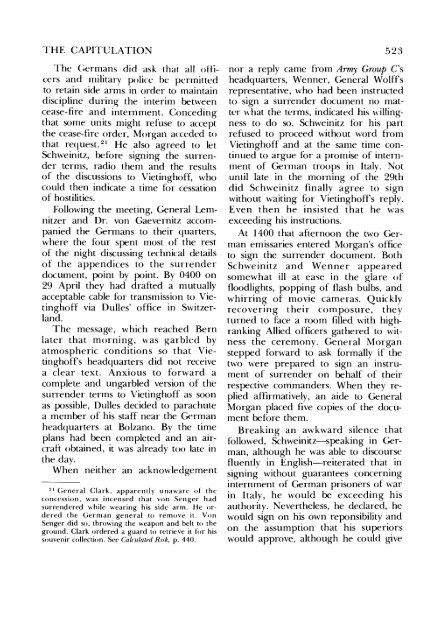Cassino to the Alps - US Army Center Of Military History
Cassino to the Alps - US Army Center Of Military History
Cassino to the Alps - US Army Center Of Military History
Create successful ePaper yourself
Turn your PDF publications into a flip-book with our unique Google optimized e-Paper software.
THE CAPITULATION<br />
The Cermans did ask that all officers<br />
and military police be permitted<br />
<strong>to</strong> retain side arms in order <strong>to</strong> maintain<br />
discipline durin!2; <strong>the</strong> interim between<br />
cease-fire and internment. Conceding<br />
that some units might refuse <strong>to</strong> accept<br />
<strong>the</strong> cease-fire order, Morgan acceded <strong>to</strong><br />
that request. 21 He also agreed <strong>to</strong> let<br />
Schweinitz, before signing <strong>the</strong> surrender<br />
terms, radio <strong>the</strong>m and <strong>the</strong> results<br />
of <strong>the</strong> discussions <strong>to</strong> Vietinghoff, who<br />
could <strong>the</strong>n indicate a time for cessation<br />
of hostilities.<br />
Following <strong>the</strong> meeting, General Lemnitzer<br />
and Dr. von Gaevernitz accompanied<br />
<strong>the</strong> Germans <strong>to</strong> <strong>the</strong>ir quarters,<br />
where <strong>the</strong> four spent most of <strong>the</strong> rest<br />
of <strong>the</strong> night discussing technical details<br />
of <strong>the</strong> appendices <strong>to</strong> <strong>the</strong> surrender<br />
document, point by point. By 0400 on<br />
29 April <strong>the</strong>y had drafted a mutually<br />
acceptable cable for transmission <strong>to</strong> Vietinghoff<br />
via Dulles' office in Switzerland.<br />
The message, which reached Bern<br />
later that morning, was garbled by<br />
atmospheric conditions so that Vietinghoffs<br />
headquarters did not receive<br />
a clear text. Anxious <strong>to</strong> forward a<br />
complete and ungarbled version of <strong>the</strong><br />
surrender terms <strong>to</strong> Vietinghoff as soon<br />
as possible, Dulles decided <strong>to</strong> parachute<br />
a member of his staff near <strong>the</strong> German<br />
headquarters at Bolzano. By <strong>the</strong> time<br />
plans had been completed and an aircraft<br />
obtained, it was already <strong>to</strong>o late in<br />
<strong>the</strong> day.<br />
When nei<strong>the</strong>r an acknowledgement<br />
21 General Clark, apparently unaware of <strong>the</strong><br />
concession, was incensed that von Senger had<br />
surrendered while wearing his side arm. He ordered<br />
<strong>the</strong> German general <strong>to</strong> remove it. Von<br />
Senger did so, throwing <strong>the</strong> weapon and belt <strong>to</strong> <strong>the</strong><br />
ground. Clark ordered a guard <strong>to</strong> retrieve it for his<br />
souvenir collection. See Cau:ulatrd Risk, p. 440.<br />
523<br />
nor a reply came from <strong>Army</strong> Group C's<br />
headquarters, Wenner, General Wolffs<br />
representative, who had been instructed<br />
<strong>to</strong> sign a surrender document no matter<br />
what <strong>the</strong> terms, indicated his willingness<br />
<strong>to</strong> do so. Schweinitz for his part<br />
refused <strong>to</strong> proceed without word from<br />
Vietinghoff and at <strong>the</strong> same time continued<br />
<strong>to</strong> argue for a promise of internment<br />
of German troops in Italy. Not<br />
until late in <strong>the</strong> morning of <strong>the</strong> 29th<br />
did Schweinitz finally agree <strong>to</strong> sign<br />
without waiting for Vietinghoffs reply.<br />
Even <strong>the</strong>n he insisted that he was<br />
exceeding his instructions.<br />
At 1400 that afternoon <strong>the</strong> two German<br />
emissaries entered Morgan's office<br />
<strong>to</strong> sign <strong>the</strong> surrender document. Both<br />
Schweinitz and Wenner appeared<br />
somewhat ill at ea5e in <strong>the</strong> glare of<br />
floodlights, popping of flash bulbs, and<br />
whirring of movie cameras. Quickly<br />
recovering <strong>the</strong>ir composure, <strong>the</strong>y<br />
turned <strong>to</strong> face a room filled with highranking<br />
Allied officers ga<strong>the</strong>red <strong>to</strong> witness<br />
<strong>the</strong> ceremony. General Morgan<br />
stepped forward <strong>to</strong> ask formally if <strong>the</strong><br />
two were prepared <strong>to</strong> sign an instrument<br />
of surrender on behalf of <strong>the</strong>ir<br />
respective commanders. When <strong>the</strong>y replied<br />
affirmatively, an aide <strong>to</strong> General<br />
Morgan placed five copies of <strong>the</strong> document<br />
before <strong>the</strong>m.<br />
Breaking an awkward silence that<br />
followed, Schweinitz-speaking in German,<br />
although he was able <strong>to</strong> discourse<br />
fluently in English-reiterated that in<br />
signing without guarantees concerning<br />
internment of German prisoners of war<br />
in Italy, he would be exceeding his<br />
authority. Never<strong>the</strong>less, he declared, he<br />
would sign on his own reponsibility and<br />
on <strong>the</strong> assumption that his superiors<br />
would approve, although he could give
















